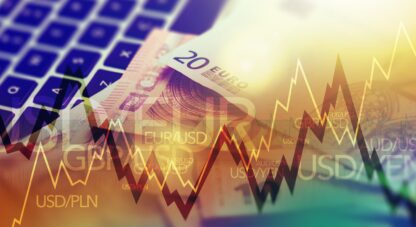Podcast: Play in new window
- UK faces 18% inflation
- You can’t fix inflation harm with deflation
- Choose your executioner, Greek or Italian
From Russia With Love: Europe’s Energy Catastrophe
September 7, 2022
“European stress is increasing as financial stress increases. You’re really talking about social anxieties and political stress that gets played out. TPI [transmission protection instrument] acting as a smoke screen for the ECB balance sheet reshuffling. After our medical and social experimentation with COVID, we’ve put ourselves in the worst possible position, not just in Europe, not just in the US, but globally.” — David McAlvany
Kevin: Welcome to the McAlvany Weekly Commentary. I’m Kevin Orrick, along with David McAlvany.
Gosh, Dave, from the German energy crisis to the difficulty of the French cooling their nuclear reactors because the rivers are getting hot, and you’ve got the Ukrainian situation with Russia. It almost sounds like a James Bond movie. But we sort of need the real James Bond back, don’t we? I mean, I’m thinking Sean Connery at this point.
David: From Russia with Love. Yeah. No, there’s some similarities, maybe some differences too. 1963, Sean Connery, a lot has changed since then. All you have to do is watch the trailer for that movie and know that a lot has changed since then, versus 2022. We’re not at the present seeking a decoder or an encryption device that’ll access Soviet state secrets and unbalance the world order, quite the opposite from Spectre. It’s the Russians who are destabilizing. All we’re seeking is reliable energy that can’t be leveraged and weaponized to do that very thing, remake the world order after tearing apart the old one. We have Gazprom and Russian state announcement that there will be an indefinite suspension of supplies from Nord Stream 1. And maybe that’s a different version of From Russia with Love. I think the best thing to do with an abusive relationship is get out of it, and I think the Europeans have maybe some application of that principle right here and now.
Kevin: Last week you were making comments about the German energy policy and how it was shortsighted. It was going green before they actually had a replacement for it. But France, we had talked about France keeping their nuclear reactors working. I just mentioned, they’re working a little hotter than they were before, and there’s concern, isn’t there?
David: That’s right. Just to balance out those comments on policy shortsightedness, there’s issues everywhere. And the spike in temperatures across the continent this summer, the French are having difficulty cooling their nuclear plants because the river temperatures have risen past the required or preferred thresholds. No one in Europe is exempt from current energy pressures. Some are climate related up to and including rivers that move coal and rivers below levels that are allowing for shipping. We’ve got that up and down the line. You’ve got some of them on the other hand which are compliments of Vlad. And Russia’s indefinite closure of Nord Stream 1 till all sanctions are removed simply upped the geopolitical stakes as well as the domestic political challenges for governments across Europe. Not a surprise that Germany very quickly announced a 65 billion euro package to help defray energy costs to consumers and businesses following that announcement from Russia that Nord Stream 1 would be closed indefinitely.
Kevin: Well, it seems like it’s the perfect storm. I mean, you’ve got the energy situation with costs just skyrocketing. I mean, oil, it’s the equivalent of thousand-dollar a barrel oil here, what’s going on in Europe. But my question would be, isn’t this like a fever? When you get a fever in your body, it affects everything. And you only have a certain margin before that fever ultimately kills you. Inflation is a little bit like a fever, isn’t it?
David: Yeah. But interestingly, I mean, when you think about fever, we intervene regularly to bring a fever down, right? But if you look at the natural body cycle, getting in a hot bath and bringing the fever up and having the fever break is a natural course within the body cycle. We don’t think of feeding inflation and making it worse to make it better. I’m not suggesting that that would be the case. But I think you look at the crisis that we have with Russia, and it probably is going to get worse before it gets better. Russia is wreaking havoc across the continent. There’s factions within Europe that are becoming more vocal about acquiescing to Putin, which would be a disaster. Now that energy supplies have been weaponized, they’re going to continue to carry a real threat and be a point of leverage forever.
Kevin: Well, and you said the continent, but it’s not just the continent. Look at the inflation rate in the UK right now.
David: Oh, sure. The only way forward for whether it’s the UK or Europe in general is to make Russian supplies irrelevant. Once Putin loses an ability to leverage Russian supplies, he’ll take what he can get. So whether it’s supplies from Qatar or the US, other natural gas sources, no sources need to fill in. This week, we have Russia starting joint military exercises with China and India and Belarus. That all commenced last week prior to the temporary technical closure of Nord Stream 1. At the time, Siemens was being blamed for the problem. But again, sanctions have to be removed. It’s no longer a technical glitch. And so we do have this ratcheting up of geopolitical issues as well as local domestic issues in each country, and the UK is certainly no exception.
Kevin: You’ve been a real proponent of having reserves. Okay? Whether you’re an athlete that’s running a long, long race, and you do run long races, or having reserves in the bank so that you have a crisis. A lot of times we can look at crisis and say, “Well, gosh, we couldn’t have helped this because we had all these things happening at once.” If you have massive debt, all you can do is borrow more or print money to try to pay it off, but that’s what’s creating this inflation right now. It’s not just energy prices. But going to Britain, I mean, 18%.
David: The volatility of energy prices and its impact on inflation, it is impacting folks. This is more than just a few countries in the eurozone which are feeling the heat. The city analysts expect UK inflation to pass 18% by year-end because of energy costs increasing. There’s a new prime minister at Number 10. Liz Truss has replaced Boris Johnson, and is inheriting a very tough situation. Italy is facing the same pressures, but with a few distinctions. This goes back to reserves or latitude or options. Italy made some trade-offs. They gained access to a different bank and a different set of income flows, and they are now in a bind. They can’t do the same things that the UK can. Again, energy costs are up 80% in Italy, their debt to GDP figure is roughly 150%. They don’t have much latitude to step in and subsidize the price increases for very long without potentially triggering another eurozone debt crisis. And what I was getting at in terms of those trade-offs is they mothballed their printing press in order to join the European monetary unit. And so Italian debt is indicating these current pressures, of course, and forecasting still more to come. We had some reprieve in the debt markets, if you look at July and August figures, where yields were coming down. Yields are, again, racing towards the peaks that we saw in mid-June. And this would be true of most of your peripheral European countries. The Italy increase stands out. They’re like two jockeys competing to see who gets their first back to recent high yields.
Kevin: Yeah. But maybe what we can do is just cap the prices. That’s what they’ll think. It’s like, “All right. Well, we’ve not created this problem. Somebody else has. We’re just going to cap energy prices.” What it reminds me of, Dave, since they’re not taking responsibility for the problem that they created, I mean, the whole controlling community, like the central bank community and the governments, it reminds me of that bumper sticker, the party animal that says, “Bad liver. Bad, bad liver.” Yeah, it’s not the liver’s problem.
David: Yeah, confusion about causation. Well, so you’ve got a number of European governments that are now discussing the price gaps, as you mentioned, with electricity producers, and then of course profit limits for energy providers. And I think that will be very popular, right? Because nobody wants to pay higher energy costs. And if the government doesn’t have the ability to cover the cost themselves, then you have to vilify and go after the “real enemy.” And it’s the classic political art of redirection. Who’s responsible for the energy crisis? Not the idealistic bureaucrat. Not the green party advocate who’s demonized nuclear energy as dirty and dangerous for decades, and in fact, pushed for dependency on cleaner, grant you, natural gas, but the source is the problem, from Russia. Putin, yes, he’s a part of it. Energy companies, certainly they’re going to be blamed, but never would you see an Agenda 21-inspired administrative class—
Kevin: Oh, don’t take any responsibility there.
David: —take responsibility.
Kevin: No, no, no. Bad liver. Bad, bad liver.
David: Truss, rather than attacking energy companies, has in her first 48 hours proposed a 130 billion pound intervention for households and an additional 40 billion for companies.
Kevin: Let’s print money.
David: The state will cover the increase in costs. Now, you can be critical of that, and certainly the MMT [Modern Monetary Theory] crowd will be pleased that this is to prove a point. You have a printing press and you have the ability to increase any amount of debt that you want. It’s just no problem. And I’m not saying that that is an acceptable solution, but they do have the latitude. They do have options. Because they didn’t take the trade off, join the EU—join the EMU—and lose their monetary sovereignty. Is this an abuse of the pound? Yes. But is that a card that they can play whereas the Italians can’t? And you see it show up immediately in the debt market. This is a really intriguing difference. One of the things that Truss is going to attempt to do is keep people off the streets protesting untenably high bills in the months ahead. And she’s doing it on the state’s budget, if you will. This is greater than 5% of UK GDP, and roughly what they spend on the national health service, is this one-off energy intervention.
Kevin: It reminds me of a story. Madam Lagarde talked about this anti-fragmentation tool, and there’s a new name for something similar to that. And the whole idea is to go get rid of the good and take care of the bad. I remember a story reading somewhere. It was a jazz musician who played with Charlie Parker. It could have been Dizzy Gillespie who talked about it. I can’t remember. Because Dizzy stayed away from the drugs. Charlie was completely addicted to heroin and alcohol. Now, he was an amazing sax player. I mean, Yardbird Parker. But on his way to a gig he needed a heroin hit. And he literally sold his alto sax on the way to the gig to get heroin. And it was the gig that was paying for the next heroin hit. But I think about that. You look at the European response to anti-fragmentation or whatever you want to call it. It’s really taking the good and buying the bad, right? Just trying. It’s— What is that? Core to periphery, or how would you state that?
David: Well, by creating this idealistic union, again, there was a series of trade-offs, there was some benefits to it, of course, but then how you deal with problems gets a little fuzzy. You’ve got some cases in which the state is responsible, some cases in which the ECB will have to be responsible as this sort of overarching transnational organization.
And so from Madam Lagarde, we first had the announcement of the anti-fragmentation tool. That was earlier this year. Now we have the transmission protection instrument. It’s not really well explained what the TPI is or what it does. It just does everything that is necessary, and that’s implied of course. But it’s veiled language, veiled language for the selling of European debt at the core, buying of European debt at the periphery. The ECB will have to raise rates from zero. Remember the last increase was from negative 50 basis points to zero. And so far that’s their version of fighting inflation.
We’ve got German inflation at 8.8. We’ve got, across the 19 members of the ECB, announcement of consumer price inflation for August of 9.1%—again, for both of these, German and the transnational number, 40-year highs. He wasn’t around 40 years ago, but all time highs in that case. They have to raise rates at least 50 basis points. They have to. But again, we’re playing with words, transmission protection instrument. The ECB is just going to come in and clean up with a mop, and there’s going to be zero consequences into the marketplace. Oh, no. Au contraire. Look at how the euro is trading.
Kevin: Well, and let’s just go back in a time machine a little bit, Dave. I’m going to put this in perspective because you’ve been running Half Iron Man and Iron Man now for seven years. Okay. Actually, no, six years. Because 2015 you basically said to everybody at the office, you made the announcement you would pay for the cost of the race if we wanted to train and go do a half marathon. That was in 2015. So 2016, if I remember right, is when we did that. And that was a lot of fun. You’ve continued doing that. The last six years we have had two things going on. One is you training all the time.
David: Okay.
Kevin: I mean, you’re working too, but I don’t know how you do it. But the other thing, too, is, if you remember 2015 when you made that announcement, the world had never seen negative interest rates in 4,000 years of history. And in 2015, Dave, Europe went negative. We’re about to see that reverse. This is going to happen now. Negative interest rates were an anomaly that should have never happened, and now we’re paying the price.
David: Yeah, you’re right in nominal terms. In real, inflation adjusted terms, we’ve had negative rates.
Kevin: No, I’m just talking about nominal.
David: Not in nominal terms.
Kevin: Yeah.
David: They should increase 75 basis points or more, but the ramifications in doing so for peripheral European debt and the repricing of that debt, frankly, as collateral held within the banking system, that’s a reasonable concern, reasonable concern for bankers, reasonable concern for central bankers. They want to fight inflation, they have to talk tough. They’ve got their TPIs and their anti-fragmentation tools, but they can’t do a whole lot.
I mean, the argument is that the ECB is becoming a bad bank, like we saw established during the global financial crisis. Special purpose vehicles helping to segment out and sort out toxic credit from less or non-toxic credit, that argument’s becoming stronger and stronger by the day. Again, the abuse of these anti-fragmentation or transmission protection instruments.
And frankly, there’s a legitimate question about there being a legal challenge or a legal issue. The ECB is not supposed to finance individual member states. And I think this is where a lot of the opacity around the TPI program exists. That’s in essence what the TPI is doing, is financing individual member states.
I think one lesson to be learned from this, or even go back to 2008 and 2009—when acronyms proliferate, we should all be wary. What you see is not what you get. And how something is heralded might in fact be something quite different. Not only is language ambiguous, but the propaganda value of an acronym can’t be overstated.
Kevin: This brings up a sore subject for me, Dave. Because what we’re seeing is the need to control from the top, everything, whether it’s vaccinations and disease or central banking. And they’re losing control. It reminds me of Lucille Ball at the chocolate factory. Remember that? It’s working just fine for a little while, and then she has to start eating the chocolate.
David: She can’t keep up with the assembly line.
Kevin: She cannot keep up. And you cannot manage some of these things from the top down.
David: Some of them, they’re not intended to be managed. And this is— Jim Grant was recently comparing the Fed to the CDC, the heads of which he said could be swapped. The leadership swapped. And he’d end up with almost the same policy. He says the officials share this predilection for control and a reciprocal mistrust of the capacity of individuals to protect themselves against a bug and of the market to set a rate of interest. And he says the interventionist impulse, along with its evil twin, an habitual blind eye to the consequences of intervention, is a cross-disciplinary personality tick.
He’s right. It’s a mode of thinking, a superior mode of thinking that says we can make decisions for everyone. And the disaggregated decision-making is not as legitimate as us—again, from a top-down standpoint—doing so. Jim Grant reminds his readers of an admonition from von Mises, in this case dealing with inflation and deflation. Deflation can never undo the harm that inflation causes. And he warns central bankers against imitating the motorist, who, after running over a pedestrian, stops his car, throws it into reverse, and backs over the same hapless victim.
We have the Fed now wanting to go into reverse. We’ve got to create demand destruction. We have to slow the economy and, in effect, create a recession such that we can lower the price pressures. That’s the mode that we’re in now. My dad told me the story of a well-intentioned effort to save a box turtle from being hit as it crossed the road. And as he threw his vehicle into reverse to go back and do good, he heard and felt the unfortunate crunch. Right? I think central bankers of our day do not intend the harm they cause. But once they’ve caused harm, they seem unable to connect effect with cause and appreciate that they’ve just crushed someone, by either moving forward or throwing it into reverse.
Kevin: In a way it’s a Humpty Dumpty syndrome. I mean, you learn as a little kid, once he falls off the wall, all the king’s horses, all the king’s men, they can’t put Humpty back together again. But we’ve got an unusual situation, Dave. The dollar is hitting all-time highs. We don’t have energy problems like the European situation. We don’t have $1,000 a barrel oil like the equivalent would be over in Europe. What’s it look like for the United States? We have the debt, we don’t have the reserves, so we’ve got to be careful there. But how are we looking now?
David: Yeah. Well, the dollar is hitting new highs for this cycle. And from an energy standpoint, we’re in a far superior position in the US—at present, that is. You get natural gas prices that can always go parabolic here as well. And that depends on production. It depends on production rates. It depends on decline rates. Lest we forget, the gods of shale giveth and the gods of shale taketh away. We have such a massive economic advantage now, but the energy component here in the US should never be taken for granted.
Kevin: Does that give us a blind spot? I mean, are we going to have woes like we’re seeing in Europe coming from a different direction?
David: It’s a huge blind spot, and I think it’s twofold. One is the deficit to come, and the other is this energy advantage which can go away very quickly. You look at where we’re at in terms of the production curve for Marcellus and Haynesville. And these are two fields which provide us with ample gas today. But again, decline rates are everything. And within the world of shale, you watch that very closely to see ultimately where prices are headed for the natural gas market.
Our budget woes here in the US are coming from other places. And we’ve talked about Europe, and they’ve got energy subsidies which they’re having to introduce, and windfall profit taxes, which are not on the table here yet. Ours are largely self-inflicted wounds.
Last week we highlighted the increase in QT, quantitative tightening, commencing in September. Now 95 billion in balance sheet reductions on a monthly basis.
One further comment on that. The interest collected on the mortgage-backed securities and the Treasury positions currently on the Fed balance sheet, according to the July 26th/27th FOMC minutes, will not be sufficient for remittances to the Treasury department as we move into next year. The Fed expects net income to turn negative almost immediately here in the next couple of months. When it’s positive, net income is positive for the Federal Reserve, they don’t get to pocket the money. Those funds are remitted back to the Treasury and show up as revenue.
Kevin: What does that mean?
David: Translation: Next year we will not have the benefit of a hundred billion dollars in income to the Treasury from the Federal Reserve remittances. That’s point number one. Now, add to that the increase in liabilities from the student loan forgiveness scheme, 468.6 billion in the first year. That’s according to the University of Pennsylvania, Wharton Budget Modeling. And then, point three, add the 984 billion budget deficit penciled in for next year from the Congressional Budget Office—which assumes no recession, by the way—and you’re already at 1.55 trillion for the 2023 deficit.
Kevin: Okay. But what if we have the obviously coming recession?
David: Okay. So factor in a mild recession, and you can add at least 300 billion to the deficit numbers, taking it to just below 2 trillion, 1.85 trillion, close enough for government work. A severe recession, on the other hand, not impossible to imagine, could add—as it did, this is 2008, 2009 as a reference point—a reduction of GDP by 9.8%. Factor that into the deficit figure and you’ve got 2.44 trillion dollars added to the deficit, 2.44 plus your 1.55. I mean, you’re coming up on $4 trillion as an outside possibility.
That would be interesting. That would be interesting for the US bond markets and interesting for the currency markets. Rates would undoubtedly go higher, and the US currency could then join the race to the bottom as our finances look and feel a lot more Greek or Italian.
Kevin: What does that do for the limit on the US dollar? I mean, it’s hitting all time highs, right?
David: And we talked about that last week. Perhaps there’s no ceiling to the US dollar. If the world is circling the drain, doesn’t the US dollar look better and better by comparison in the world of fiat on a relative basis? And I’d say, actually, putting in a long-term top in the dollar is possible if, number one, the energy markets roll over here in the United States. And that is from a production standpoint, where we are not able to produce as much. We drill and drill and drill, but we’re not able to produce more and more and more.
So, energy market is number one, and number two, our deficits start to really impress—again, impress not in a positive way. But if we are in the 2½, 3, 3½, 4 trillion dollar range, because the recession is not mild, but is in fact quite severe, then I think you’re talking about a long-term top in the dollar. I think that is likely the scenario that plays out over the next three to six months, and is one of those key, key inflection points if you’re a gold owner. If you’re a metals trader, a key, key inflection point. Because the only thing holding gold back at this point is a strong dollar.
Kevin: Yeah. No, it’s rising in the other foreign currencies. But what you’re telling people is hold onto your horses. Don’t get excited if you have a spike in the dollar, maybe a spike down on gold. It’ll be temporary. It’ll probably signal a reversal long term.
David: It might be the last generational opportunity to load the boat.
Kevin: Wow.
David: And I say generational because we’re talking about the dollar moving lower, not for six months or a year, but the dollar moving lower potentially for a decade or more.
Kevin: Wow. What does that do for the gold owner for the next decade?
David: It’s gets interesting.
Kevin: Yeah, I’ll bet. Well, I had mentioned last week that I had paid for college for two of my kids, the only two of my kids. And I really didn’t want to pay for college for everybody else. How’s that going right now with the labor markets?
David: Student loan forgiveness scheme, as we suspected, went over like a lead balloon with labor. Pennsylvania iron workers asking the question, “Why should I pay for someone else’s degree?”
Kevin: Makes sense.
David: Right?
Kevin: Yeah.
David: Not just you, but we are talking about future generations saddled with an extra half trillion dollars in—that’s just the first year’s obligation. What did we say? 486 billion is the first year’s obligation as estimated by University of Pennsylvania, Wharton. So an actual financial obligation. Remember we said that it was really a debt swap, an actual financial obligation exchanged for a social and political quid pro quo? Why else would it be announced this close to the election? There’s a lot of folks in the hinterlands not happy about the idea. Middle class, working class family saying, “I’m paying for your degree? Not a chance.” It could in fact backfire as we come into November.
Kevin: It makes me wonder, Dave, as we talk about this. Let’s say the dollar spikes, gold spikes down a little bit. Let’s say we do have this long-term reversal. Are we going to see a reversal with Powell? Last week you had brought up praise for a very succinct eight minute [speech.] It was terse and it was to the point, from Powell. Is there going to be follow through?
David: Well, yeah, we praised him. What we didn’t say is that Fed operations have never been surgical and precise, even though they’re implied to be very calculated and very specific buttons to press and levers to pull. There’s implied control, but it’s never been that precise. Here we are, hiking rates into a recessionary environment, and there’s no guarantee that Powell, in for a penny, is not in fact in for a pound, with no clue what the unintended consequences will be for the economy.
An intended soft landing recession may end up being very hard indeed. Having crushed the consumer moving forward, what did we have leading into this? We had the application of quantitative easing in 2022, this year, with inflation already at 8.5%. Right? They had all the indications that they needed that they should take the foot off the pedal, right, and they did not. Now they want to slow demand. It’s well intentioned, right? And it may crush the consumer yet again, kind of going back to my dad’s unfortunate story, poor little turtle.
Kevin: Okay. Let’s nail this down, Dave. A lot of times when you’ve got a situation that’s a lot of moving parts, you have to ask yourself, you pull a sheet of paper out, or a pad, and you say, “Okay, what do we know?” What do we know for our own decision making at this point?
David: Not as much as we’d like. Enough to conclude that, number one, we have an over-leveraged and overpriced financial system. Number two, we have central banks which are now convinced that to fight inflation they must raise interest rates and tighten financial conditions. And this is a new global consensus among central bankers. And so number three, as Doug Noland reminds us, rates are going to go higher until something breaks.
Is that what we’re already witnessing in the financial markets? Right? The summer rally has ended. We can see that. European stress is increasing. And we’re not talking about minute increases of stress. These are, to some degree, existential issues that each state has to answer as they address unrest on the streets. You see why Germany spent $65 billion, or obligated themselves to, instantaneously on the announcement of the Russian shutdown of Nord Stream 1. You saw how fast Ms. Truss came out and said 130 to 170 billion is what we’re playing for to keep people off the streets. Now, she said it in other words, but that is in fact what is in play.
European stress is increasing as financial stress increases. You’re really talking about social anxieties and political stress that gets played out. TPI, we mentioned earlier, acting as a smoke screen for the ECB balance sheet reshuffling. After our medical and social experimentation with COVID, we’ve put ourselves in the worst possible position. Not just in Europe, not just in the US, but globally, if we’re talking about balance sheets.
Kevin: Yeah. But talking about balance sheets, and I’ll admit it, Dave, I mean, I try to get my head around what a billion is. I try to get my head around what a trillion is. You had just mentioned our deficit being between 1.55 and all the way up to 4 trillion. I mean, what is that?
But let’s now look at the world in trillions. Let’s just talk trillions now. What does debt look like as it’s increasing, and what is the cost of paying that debt? Because from what I understand, and we’ve talked about this before, maybe I’m missing something, but there are basically only two ways to pay a debt off. You either default on it, or you devalue the currency. We’re already seeing the devaluation of the currency. What does default look like?
David: Yeah. When you think about the necessity of the importance of a global currency devaluation, think about the implications of default. Default means that someone’s asset is now worth less and it may impair the owner of that asset. Well, the owner of most liabilities are financial institutions, or people represented by financial institutions. The implications of a default are very significant for financial market stability, even the existence of the financial markets. However, a gradual inflation of the pressure is the most viable option. It’s painful, but it’s the most viable.
Kevin: Well, and look at gold worldwide, it’s rising while it falls here in the United States.
David: From a big picture perspective, if people are concerned about a daily, weekly, quarterly volatility with gold and silver, they don’t understand what’s in play. This is a super bubble on a global scale in every asset class that is in the process of bursting.
Kevin: It’s a little bit like looking at the lifeboats off of the Titanic and saying, “I’m not getting in it. It’s not nearly as stable as this sinking ship.”
David: Yeah, I prefer where I’m at to going to something that bobs around uncontrollably in the water. I don’t want your lifeboat, and I think you’re asking too much for it to begin with. I think the price is going to be lower tomorrow. Maybe I’ll try then. From the beginning of the emergency, again, the COVID emergency till now, emerging market debt has increased 36.1%. That’s $26.2 trillion in the emerging market.
Kevin: That’s a T, trillion.
David: Emerging market government debt, this is government debt in the emerging markets, up 47, non-financial corporate debt in the emerging markets up 32.6%. Total global debt has increased by $52.9 trillion since the beginning of the COVID emergency. That’s 20.9%, which includes the 3.3 trillion increase in the first quarter of this year. Most of that coming from China and the US.
Going back to Doug’s point, I think this is a critical one. The source of economic growth in recent decades has come from an expansion of credit, and those credit markets are now being repriced in line with central bank reference rates. Rates will go higher until something breaks. That’s the key takeaway. It wouldn’t necessarily be the case if we were talking about a market not on steroids, but the total global debt market is now $305 trillion. Consensus is, rates must go higher to address inflation realities all over the world. But to do so is to potentially destabilize a part or the entire $305 trillion edifice.
Kevin: One of our guests a couple of times on the Commentary writes brilliant books. Andrew Smithers is going to be a guest on the show next week. And Andrew Smithers says a big part of the problem that we have is the models that everybody is completely married to. All these management models, they’re completely wrong. And at 85 years old, he has proposed a new way of looking at the models. And I don’t think he fools himself into thinking all of a sudden everybody is just going to start looking at Andrew Smithers’ way of looking at the markets. But Smithers has been right for a long time. And I know that Smithers and Jeremy Grantham, he’s the guy who got out of the market in 2000 a little bit too early, right?
David: Sure.
Kevin: 1999.
David: No, and I—
Kevin: But he was looking at Smithers work.
David: —I can understand why they’re friends. That they can compare notes and say, “Yeah, we’ve got a valuation problem.” And a quote from Jeremy in the last week, “If history repeats, the play, once again, will be a tragedy. We must hope this is time for a minor one.”
Kevin: Hmm. My kingdom for a horse.
You have been listening to the McAlvany Weekly Commentary. I’m Kevin Orrick, along with David McAlvany.
Be sure to join us next week for the Andrew Smithers interview. You can find us at mcalvany.com, M-C-A-L-V-A-N-Y. You can call us at (800) 525-9556.
This has been the McAlvany Weekly Commentary. The views expressed should not be considered to be a solicitation or a recommendation for your investment portfolio. You should consult a professional financial advisor to assess your suitability for risk and investment. Join us again next week for a new edition of the McAlvany Weekly Commentary.















